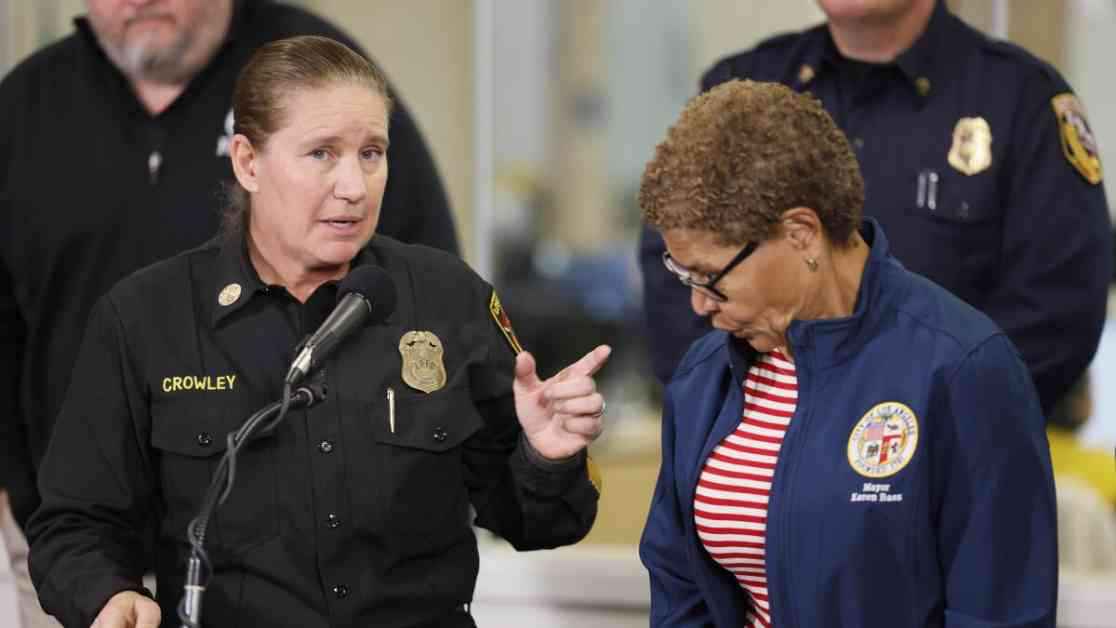The dismissal of LAFD Chief Kristin Crowley by L.A. Mayor Karen Bass was the culmination of a series of missteps that unfolded in the wake of the Pacific Palisades fire. As the flames ravaged the area, Crowley openly accused the mayor of underfunding the fire department, sparking a public feud that ultimately led to her ousting. The timing of Crowley’s public criticism, as the city grappled with a devastating disaster, raised questions about her leadership and political judgment.
Veteran political observer Fernando Guerra weighed in on the situation, highlighting Crowley’s managerial shortcomings and her perceived insubordination towards the mayor. Guerra’s assessment underscored the delicate balance between political accountability and effective crisis management. While some viewed Bass’ decision to remove Crowley as a necessary move to restore order, others saw it as a desperate attempt to regain control amid mounting challenges.
The aftermath of Crowley’s dismissal signaled a broader political shift in the city, with potential challengers eyeing next year’s mayoral election. Businessman Rick Caruso and Councilmember Monica Rodriguez emerged as key figures in the evolving landscape of Los Angeles politics. The sense of vulnerability surrounding Bass’s administration attracted attention from various quarters, with observers noting the emergence of political opportunists eager to capitalize on the mayor’s missteps.
The lack of transparency in Bass’s handling of the Palisades fire fallout further fueled public discontent. From the controversy surrounding the appointment of a political ally as the rebuilding czar to the subsequent backtracking on payment terms, the administration faced mounting scrutiny over its decision-making process. The confusion over leadership roles and accountability only added to the growing sense of chaos within City Hall.
Critics pointed to Bass’s struggles in navigating the complex power dynamics of a city as vast and diverse as Los Angeles. While acknowledging her past accomplishments in healthcare and public service, detractors questioned her ability to lead effectively in a city plagued by pressing issues like homelessness, public safety, and environmental concerns. The firing of Crowley, viewed by many as a scapegoat for larger systemic failures, underscored the challenges of governance in a city facing multiple crises.
As the city grappled with the fallout of the Palisades fire and the subsequent political upheaval, questions lingered about the mayor’s accountability and the city’s preparedness for future disasters. The need for clear leadership and decisive action in the face of mounting challenges became increasingly apparent. The tensions between political expediency and effective governance highlighted the delicate balance that leaders must strike in times of crisis.
Bass’s statement regarding Crowley’s failure to adequately warn her about the fire risk reflected a broader pattern of miscommunication and disjointed decision-making within the city’s leadership. The disconnect between the mayor and the fire chief underscored the need for improved coordination and communication in emergency response efforts. As the city grappled with the aftermath of the fire, calls for greater transparency and accountability resonated across the community.
In a city known for its resilience and spirit of innovation, the challenges facing Los Angeles in the aftermath of the Palisades fire served as a stark reminder of the importance of effective leadership and preparedness. As the city navigated the complexities of governance and crisis management, the role of elected officials in ensuring the safety and well-being of residents came under intense scrutiny. The lessons learned from this episode would undoubtedly shape the city’s future response to emergencies and its approach to governance.


